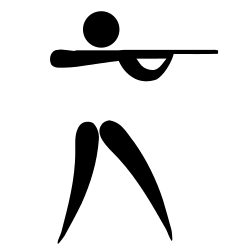Contents
| Men's 50 metre pistol at the Games of the XIV Olympiad | ||||||||||
|---|---|---|---|---|---|---|---|---|---|---|
 Shooting pictogram | ||||||||||
| Venue | National Shooting Centre | |||||||||
| Date | 2 August 1948 | |||||||||
| Competitors | 50 from 22 nations | |||||||||
| Winning score | 545 | |||||||||
| Medalists | ||||||||||
| ||||||||||
| Shooting at the 1948 Summer Olympics | |
|---|---|
 | |
| Rifle | |
| 300 metre rifle | men |
| 50 m rifle, prone | men |
| Pistol | |
| 25 m rapid fire pistol | men |
| 50 metre pistol | men |
The men's ISSF 50 meter pistol was a shooting sports event held as part of the Shooting at the 1948 Summer Olympics programme. It was the seventh appearance of the event. The competition was held on 2 August 1948 at the shooting ranges at London. 50 shooters from 22 nations competed. [1] Nations had been limited to three shooters each since the 1932 Games. The event was won by Edwin Vásquez of Peru in the nation's debut in the free pistol. Vásquez is still (through the 2020 Games) the only Peruvian athlete to win a gold medal at an Olympic Games. [2] Rudolf Schnyder of Switzerland took silver. Defending champion Torsten Ullman of Sweden earned bronze, the second man to win multiple medals in the event.